
一个由青年主导的哲学社团。
Why should we be wary of the word "Wu sign"?
"This article was originally published in the public account of Philosophia Philosophy Society on July 25, 2021"
Author / Xing Yuan, Wu Duan, Hui Jie, CC
Summary
- "Sexual shaming" inadvertently strengthens androcentric linguistic power systems; at the same time, because of the lack of a suitable environment, it is difficult to encourage men to empathize with the same kind of shaming that women often experience.
- The act of "criticizing Wu Yifan" is far from being equivalent to "voicing for the victimized women". After considering the symbolic image of Wu Yifan and his female fans in the hearts of misogynistic men, it can be found that "Wu sign" and sexual organ shaming were misappropriated by them as a means of reinforcing misogyny, and they used this whole incident to Confirm your own set of masculinities. Therefore, the use of the term "Wu sign" carries considerable risks, and one must be extra vigilant.
- However, it is also unwise to directly condemn any person or behavior that uses "Wu Bi", and we need to judge according to its specific different contexts. In some cases, such use is acceptable or even completely reasonable.
- In general, while feminism exposes the so-called "objective neutrality of reason", it cannot without discretion consider the words of ridicule and humiliation as effective radical actions.
foreword
Recently, social news about "Kris Wu is suspected of seducing several young women" has caused widespread discussion. The development of the incident itself has been stripped away in the police intelligence reports and major analysis posts, and this article hopes to focus on such an expression: "Wu sign" for discussion.
In the Weibo posted by the victim Du Moumou, he pointed out that the former boy group member and popular entertainment star Wu Yifan deceived many young women, including minors, to have sex with the victim after drinking and other bad behaviors. Among them, there are several sentences mentioning that Wu Yifan's reproductive organs and abilities are weak, and at the same time, he also expresses the details of his confident remarks to his female companion, such as "I am very big, please bear with me". Weibo suggested that Wu Yifan should change his name to "Wu Xian" to match the performance of his organs. This is also the source of the recent Internet buzzword "Wu sign". Many memes and jokes came into being:

Even the official account has been "revamped":

However, is there a hidden risk behind this popular vocabulary?
1 Who did the humiliation sign insult? - Sexual shaming and the androcentric discourse behind it
The stalk of "Wu Xian" is certainly "to the point." However, while snickering, we should stop and think about what the word "Wu Xia" can reveal about Wu Yifan's characteristics. And who is the object of the humiliation?
Clearly, the term was aimed at Kris Wu's "masculinity": by implying that men with small genitals were not masculine enough and mocking their sexual incompetence, the incident was quickly thrust into the public eye. Admittedly, this is a smart strategy. It has effectively gained the attention of media and public opinion on various platforms, but why is this strategy so efficient? In other words, it is obvious that the signing is small and the sexual crime is serious. Why does the crusade against sexual crimes use the traffic attraction of "signing" to make a loud noise in the public eye? Why is the most talked about star's genital size and size Sexuality, not whether he committed a crime, when he committed a crime, how he committed a crime, how to deal with it, etc.?
Here, this article is not a question or torture, but a sincere discussion. The social discourse and atmosphere of male-centrism is hidden behind the thousands of waves provoked by the "sign", which regards the prominence of male sexuality as a virtue, while the lack of male sexuality is regarded as a defect. The humiliation unintentionally identifies and reinforces this male-centred linguistic power system. Because the word "Wu sign" has nothing to do with culpability, but only about male sexual characteristics and sexual ability.
It is true that scolding some androcentrists as "Flammulina velutipes" can be very pleasing. After all, it is difficult for one's actions to break away from the value system behind the deeply rooted social discourse system of male-centrism, and language expression is a creation born of social culture. In a society that shouts masculinity and uses masculinity to define power relations, depriving a man of masculinity has naturally become the most effective verbal revenge strategy. A male-centred social discourse.
However, from the perspective of the feminist movement as a whole, attacking each other (men humiliate women, women fight back in the same way) is not the best strategy for action, because it still uses a masculine phallus-centric discourse. With a homomorphic revenge-style approach, the risk is sacrificing discussions of sound political foundations. In short, the value it promotes is not "all people are equal regardless of gender" but "if you humiliate us, we can humiliate you." , it is more difficult to make feminist ethics a universal basis for political and ethical discussion. In this situation, feminists and opponents compete for the universal status of masculinity. It's not meaningless, it's limiting.
At the same time, some would claim that this kind of humiliation, in its own right, is an attempt to get men to experience the genital humiliation that women experience on a daily basis, along with body humiliation, slut humiliation, and staring. But obviously, without the proper environment to facilitate this, it is difficult to elicit empathy and introspection. However, in general public speaking, this kind of environment that promotes empathy does not exist. Just imagine the hostility and distrust already created by the anonymity and virtuality of cyberspace, and the topic of sexual harassment, even as feminist proponents engage in genital shaming while actively trying to empathize with potential male audiences , will limit the effectiveness of such efforts.
For empathy to be truly possible, we need an environment that is less confrontational, less reliant on "reciprocal sanctions," and more psychologically prepared and contextualized. Many people lack the proper conceptual and cognitive framework to understand negative experiences they never experience. Even those who experience these kinds of experiences themselves can sometimes struggle to find the right concept—an obvious example is that the concept of "sexual harassment" was not invented by the American feminist Lin Farley until 1974-1975, although the phenomenon Early on.
Therefore, the promotion of empathy is only possible if there is proper guidance and discussion of the relevant concepts. The author accidentally discovered a project called See for She, which uses VR, card games and other methods to try to create an interactive environment so that participants can recognize and empathize with sexual harassment.
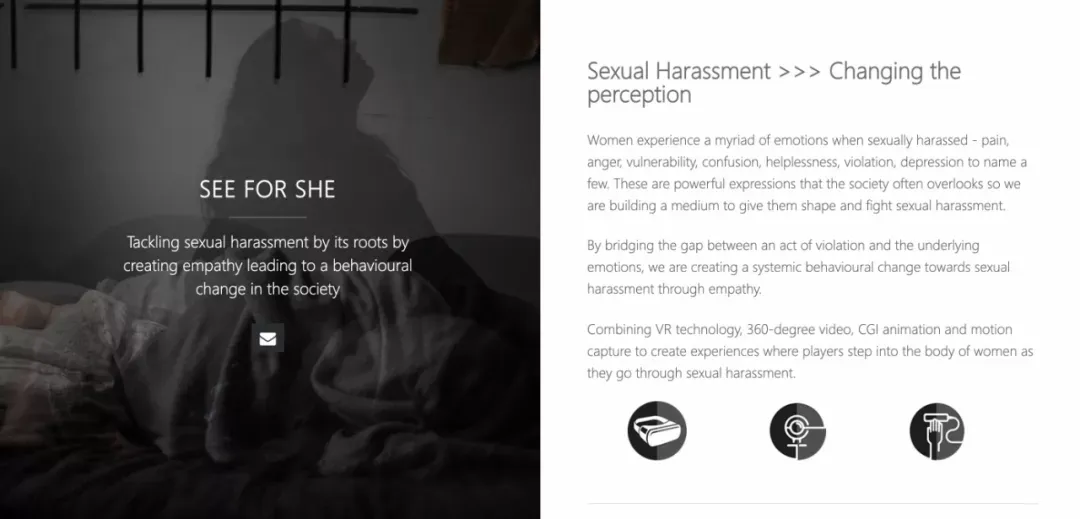
In contrast, just insulting the "sign" is difficult to achieve empathic effect - whether it is for the other party or the bystander. Such a strategy may win small keyboard battles, but it will not lead to a global victory of equality.
2 How will the "insult sign" be misappropriated by misogynists?
We should also be vigilant about what kind of characters are mixed into the slanderous "Liao" team: the words of "Liao" are highly male-centered, so there are not only people who speak for women's rights and interests in the humiliating team, but also mixed A misogynist who secretly rejoices in the powerful and "just so". They picked up the stalk of the "lottery" and turned it into a knife—a knife against a woman's back.
The side effect of introducing masculinity (temperament)-centered discourse to criticize Wu Yifan is reflected in the composition of the personnel and viewpoints involved in criticizing/attacking Wu Yifan. There are a lot of misogynists mixed in the ranks of the "shaming lottery". The purpose of these people insulting Wu Yifan is not to support female victims, nor to criticize sexual violence, but to show that they are "real men". In point of view, they not only criticized Wu Yifan, but also criticized Wu Yifan's female fans; even Wu Yifan's victims (whether they were "fans" or not). In their eyes, those women who have been victimized are either too stupid and paid the price for their money-worshiping or adoring psychology, or they are trying to seek benefits by accusing Wu Yifan.
This is very consistent with the common narrative of male misogynists (analogous to the incel group in the US): they think they deserve a girlfriend (preferably young and beautiful) and think they don't get it because of women's money-worshipping , Mu Qiangxin, and the oppression of popular (rich) men, not because of their own factors. They often condemn both women and popular men at the same time, and questioning the sexuality of "Alpha" men like Kris Wu is their common strategy. Male incels do not challenge the patriarchal structure that creates their (symbolic) status gap relative to Wu Yifans, but only want to "replace" them, and even want a more "pure" patriarchal system.
Obviously, the word "Wu Sign" does not "empower women" as some people think, but instead introduces a large number of non-female and even anti-female content into the criticism of Wu Yifan, which fundamentally threatens the Wu Yifan incident. criticism and discussion of other similar topics.
It is worth noting that the traffic industry dominated by "Xiao Xianrou" is largely oriented to the needs and tastes of female fans. Even if we are aware of the hidden power operations and economic interests, the extreme hypocrisy of many practitioners, the loss of artistic standards, and the vast shortcomings of appearance consumption, we must admit that in this field, female audiences have a certain degree of power to determine males. Artist success or not. This kind of female dominance is very rare. Therefore, misogynistic men will be very disgusted by male practitioners in this industry (the so-called fresh meat) - even these male practitioners are misogynistic in private, and even sexually assault. At the beginning of this year, the Internet's condemnation of "Niangpao" also came from this to a certain extent. And Wu Yifan, in the minds of such misogynistic men, is exactly such an image.
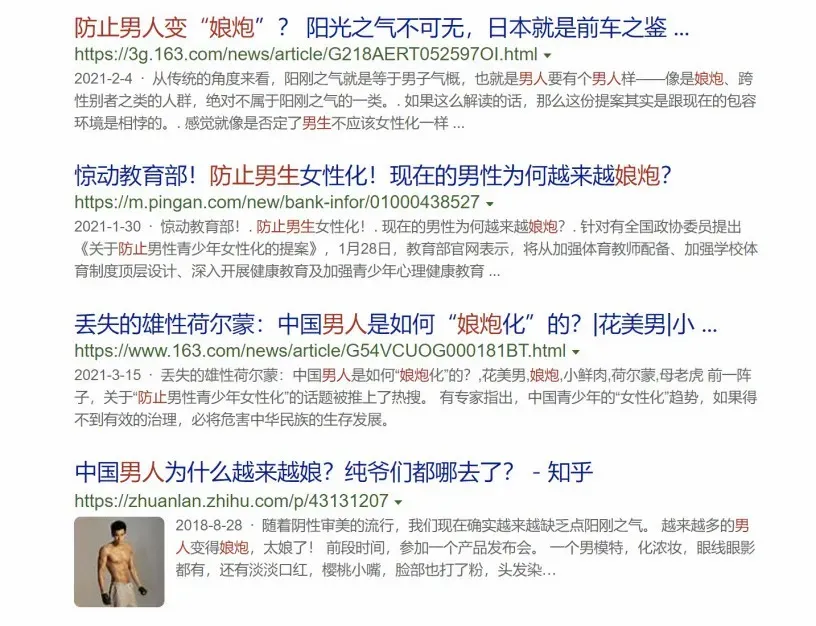
In the speeches of misogynists (often on online platforms such as Hupu and Station B), Wu Yifan's image is always associated with vexatious female fans. In addition to the above examples, Hupu users also like to take Wu Yifan's fans who exploded Hupu three years ago as an example to illustrate that Wu Yifan's (singing, now sex is added) low ability and female fans' lack of reason are inherently related.
In the process of belittling Wu Yifan and his "stupid female fans", sexual organ humiliation such as "Wu sign" occupies a crucial position. First of all, in their minds, laughing at a man's "low sexual ability" first breaks the foundation of his "dignity" as a man, which enables them to consider themselves to have a "dignity advantage" for such a "crippled man" ”, and relegated it to “heterogeneous”. Another way to portray Wu as a "non-me race" is to emphasize Wu's Canadian nationality - which of course has a direct line with misogynistic men's consistent beliefs that "foreign men seize Chinese sexual resources" and "Chinese women worship foreigners". connect. Therefore, the matter has become a "male traitor" and "anomaly" who has no masculine dignity. After attracting a large number of fanatical female fans by flattering women's aesthetics, he is "stupid" when seeking sex. He "overturned the car" and even brought himself the pain of prison.
At the same time, in the process of "humiliating the lottery", these men also incorporated "misogyny" into their (distorted) logical chain. They first laughed at how stupid and unreasonable the female fan and the victim (few people clearly distinguish between the two) that they handed over themselves to such a "crippled man" and let him "take advantage" (here They downplayed the suffering of their victims). As a result, the man who was obsessed with / took advantage of him was still a "sign" and "impotent", which made these women even more "stupid and ridiculous". A particularly interesting corroboration is that the author found that many misogynistic men focus on the accusation by the victim that Wu Yifan cannot bring sexual pleasure to women:

So it was even suggested that the whole thing happened because of the stupidity of women:

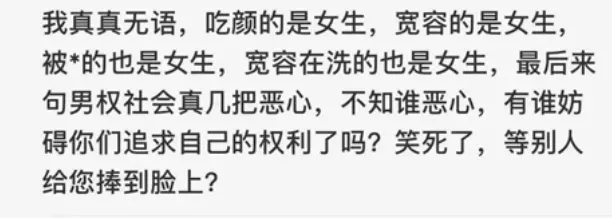
So far, we can find that the misappropriation of the word "Wu Xian" by male misogynists must be understood within the entire meaning network of gender issues in their minds. By placing genital shaming from victims into their web of meaning, they (almost coherently) cast Wu, female fans, and female accusers as some sort of incompetent or stupid or dumb" Harlequin" image. For them, criticizing "Wu Xian" is by no means a reflection on masculinity, "rape culture", or an indictment of implicit coercion. Many people don't even bother to morally accuse Wu Yifan of "looking ugly". For them, insulting Wu Yifan, especially "Wu Xian", is a complete misogyny, and it is also a self-aware and proud act. Moreover, by mocking such a rich and powerful man who is sought after by many women as a "sign", they have further established their "masculine" (related to the size of their sexual organs). This is a logic that many feminists struggle to grasp quickly.
On a larger level, the male-centrists in this incident took the opportunity to try to "confirm" not just their "masculine", but also many other legendary "masculine qualities". One of the most important is the traditional myth of the so-called male "rational" (excellent) and female "emotional" (inferior). There are two types of analysis here: one is to accuse Wu's female fans of being "irrational", and the other is to accuse feminists of being "impulsive" and gullible to victims' remarks.
The remarks on Bilibili and Hupu can effectively support this analysis. One of the most liked comments on the topic of Tiger Punch Wu Yifan is shown below:
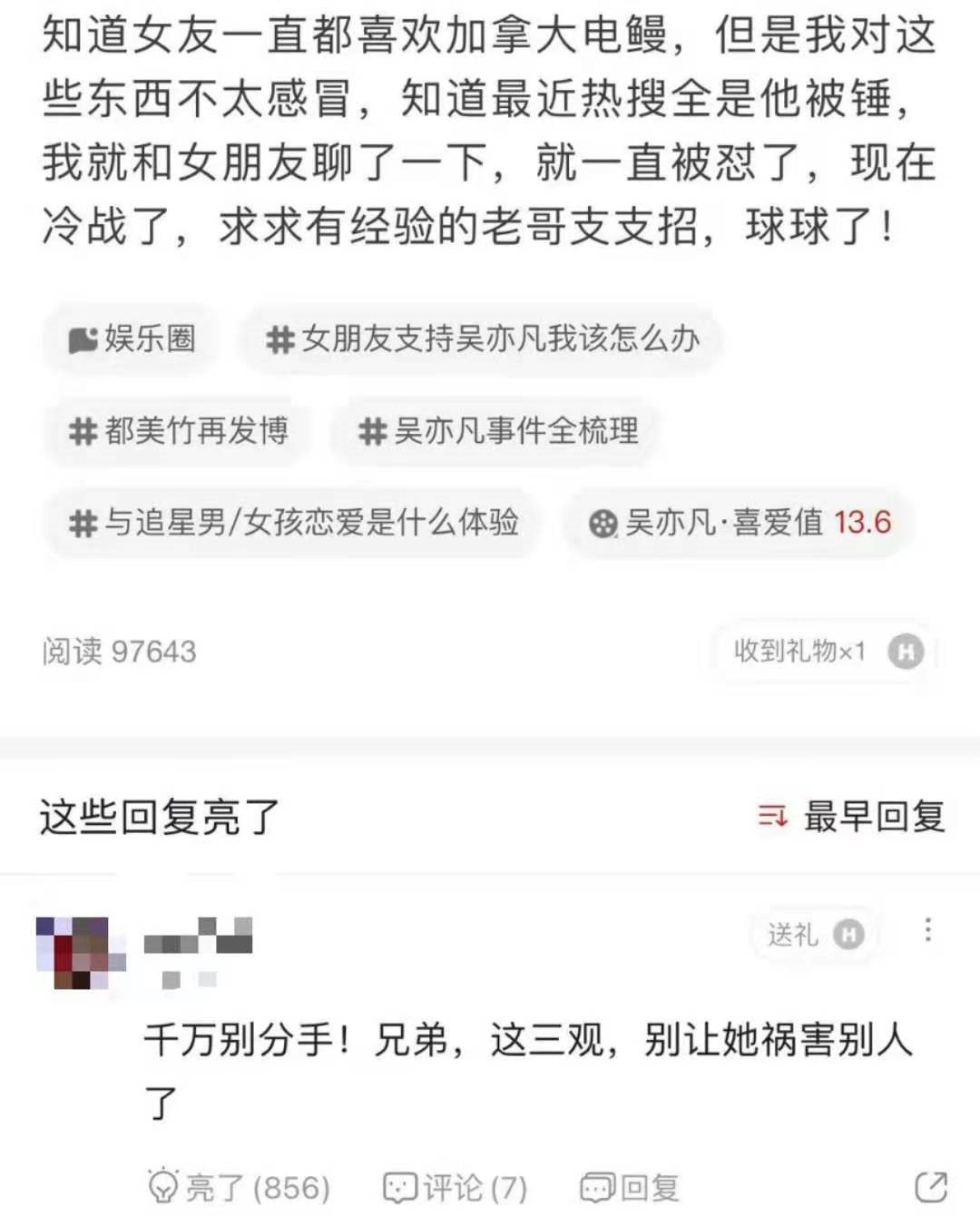
These "men who criticize Wu Yifan" just prove their rationality by criticizing these "crazy female fans" together. Even for them, this purpose is far more important than criticizing Wu Yifan's own behavior. Their criticism of Wu Yifan is generally limited to pointing out that his behavior is illegal, or that he "made a fuss", or even ridiculed his sexual ability, without mentioning the possible harm to the victim. This vulgar condemnation proves nothing.
At the same time, their mockery of feminists and other female activists is often based on similar "irrational" narratives, arguing that they (in their imaginations, feminists are of course only women) are too partial to girls who accuse Kris Wu of sexual harassment . Until the police reported the content of Wu Yifan's incident and basically confirmed some of Wu Yifan's evil deeds, Hupu's mainstream stance was "not standing on both sides, waiting for one of them to go to jail", which seemed to be a "rational, objective and neutral" attitude. They did call Wu Yifan "Signature", but they did not support the few women who spoke out. What these views have in common is that they advocate "the law shall prevail", and each side hits fifty major boards. At the same time, they are also trying to stifle further discussion by calling for "don't take up public space". An example is as follows:
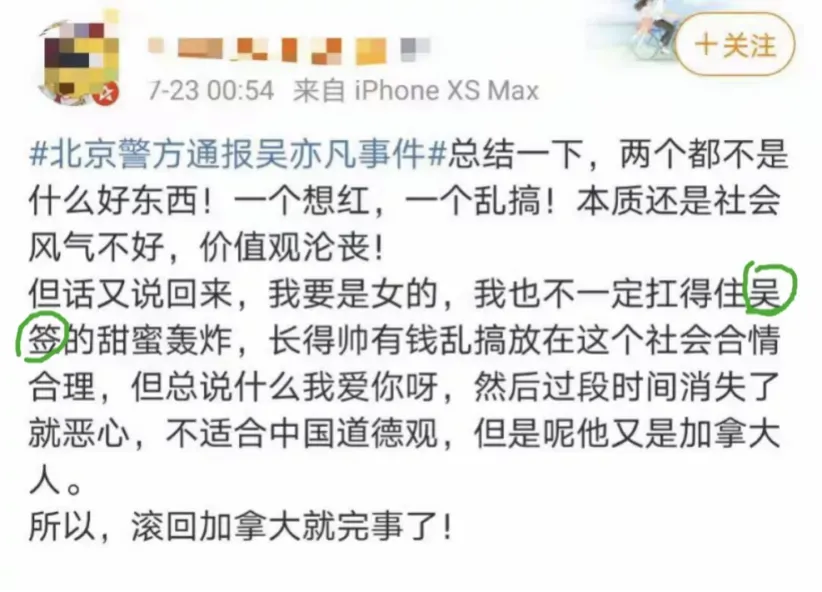
Here, we must clearly realize that they are not as rational as they claim, but only occupy the word "rational" to win the approval of their peers. Not only did they completely lack rational judgment on the seriousness of the actions of all parties (for example, judging "want to be popular" with "suspected rape"), they also apparently selectively ignored many men's defense of Wu Yifan and vitriolic insults to victims. This so-called "male rationality" is obviously not real rationality.
These statements, even if they are not playing 50 boards each, are joking and partiality. The most harmless and neutral "truth agnosticism" and "belief in the final verdict" will inevitably become superstitions. With regard to conspiracy theories, the double standards in this are already obvious: implying that the weak side has a conspiracy to bring down the strong side, while ignoring the strong side's conspiracy to suppress the victim. If, as conspiracy theorists who "know the truth" and "reasonably and objectively" say, the operation of social and current affairs is controlled by some fictitious forces, how can they "believe in the final verdict of the law"?
First, the law is the bottom line of society. Even if Kris Wu's case does not constitute rape or sexual assault, it is true that Kris Wu and the victim were deceived and seduced; the power difference between the two parties is true; Kris Wu's sexual exploitation of others is true; Kris Wu and his studio tried to falsify information and suppress the victim The author's statement is true. Secondly, rape and sexual assault-related cases are very demanding in terms of evidence collection. Even if a report is made immediately after the assault, direct evidence including body fluids, eyewitness testimony, victim testimony, and other indirect evidence are needed to prove that both parties actually engaged in sexual activity and proved that it constituted a violation of the victim's will (such as audio recordings, scars, Records proving that the victim was unconscious at the time of the sexual act, etc.). Then, for a case that was premeditated by the perpetrator, had a complete supply chain, and was carried out in the perpetrator's home, it is difficult for the criminal evidence to be completely "conclusive".
But for many of them, it's true to cast "women" as "unreasonable" and gain recognition from their male peers for their own rationality, confidence in sexuality, and a whole host of other masculinities matter. Of course, if a female companion admits it, it would be "better".
In short, many of the insults against Wu Yifan were aimed at confirming his masculinity (including sexual ability and rationality), and contained a lot of misogyny. Feminists should be wary of this attitude (especially in a context many feminists are not familiar with the logic of misogynistic men). Therefore, we must treat the term "Wu sign" (and other genital insults) with 12 points of caution, lest we accidentally provide excellent material for androcentrism.
3 So, is "humiliation" completely unacceptable?
While stating why the use of "Wu Bi" (and other genital shaming) is a behavior that requires vigilance, it is also necessary to show when and how "Wu Bi" is said -- and other types of sexual shaming -- is acceptable and even legitimate. After all, in different contexts, a word can have different objective meanings and effects.
If these distinctions are not made, we are more likely to come into conflict with other feminists and activists who hold different views, or who haven't seriously thought about it. If this analysis is mistaken for a moral condemnation of feminists, the situation might turn into: "Look, another great rethinker", "It's really reflexive", "Start blaming before you fix it" Own". Obviously, it is necessary to avoid such misunderstandings and conflicts.
We can try to come up with the following two cases:
First, we need to discuss the use of sexual ability shaming by the victim himself. We know that appealing to the motive of "eat melon" and sexual shaming to attract public opinion is sometimes one of the few resistance methods for passive victims. As we mentioned at the beginning, before the first time the person involved in this incident discussed Wu's sexuality on Weibo, he had repeatedly filed complaints on Weibo as a victim, which aroused certain public opinion. What really sparked the attention was the "decisive battle" written by the party's Weibo account on July 18 (the Weibo has been deleted), in which the word "Wu sign" was used for the first time. Excerpts have already appeared above:

Of course, there are indeed many more practical accusations in this Weibo, such as "raping underage women", but it is undeniable that "Wu sign", sexual ability humiliation, and other "melon-eating" content (such as Wu's remarks of other team members, etc.), which greatly boosted the dissemination of the news. In this case, if Weibo did not mention this content, it might also have a dissemination effect, because Wu Yifan's popularity is too great; but it can be imagined that in many other cases, this kind of "gossip" , "eat melon" is an important factor in determining whether an accusation will receive attention. Therefore, the use of "genital shaming" by the victim himself in this particular situation is acceptable - rather than condemning and trying to change the atmosphere and perceptions that place the importance of "masculinity" over "aggression" Victims who have to defend their rights and interests in this atmosphere.
Second, if it is used by supporters and allies, how should it be viewed? Although the various risks and doubts of the word "Wu Xian" have been discussed in the previous article, we should also admit that "Wu Xian" is indeed very playful and comedy, and it is a meme with a very powerful communication ability. to the point of becoming popular. The meme also played a positive role in boosting the morale of the supporters, as did some other genital-shaming words on other occasions. So, asking others not to use it at all, or even accusing others of using "Wu sign" is not only an excessively demanding morally, but also strategically difficult to achieve.
A wiser choice is to call for attention to the context when using this term, so that your Moments or Weibo readers can still clearly realize that you have not forgotten the core of the incident while they are smiling: Premeditated sexual behavior without the other party's consent, power operation reflected by the middleman "pimping" industry, psychological pressure and silence on the victim, and deceitful behavior. For example, the following image (posted by one of my friends) is a more acceptable usage:
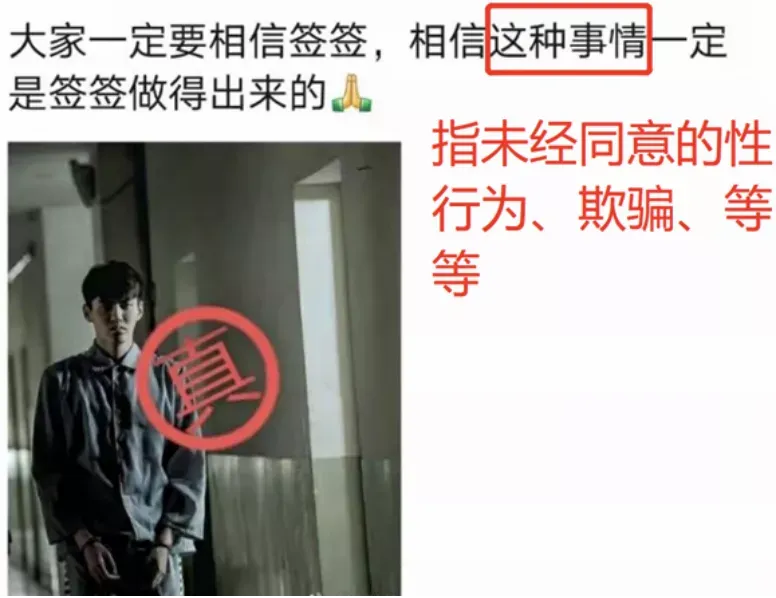
However, if you want to write informal comments that are longer than a small circle of friends or Weibo, and use genital shaming such as "Wu sign" and "pins", you should clearly and directly show that you understand "genital shaming" ' is inappropriate in what sense.
Finally, I have to reiterate that we cannot inadvertently deepen the concept of androcentrism in the process of carnival, and we must be careful to prevent misogynists from misappropriating this vocabulary and converting it into misogynistic words. The potential moral hazard here is something that each of us must face carefully.
4 epilogue
After analyzing the social culture and the meaning of the terms, we should also return to the serious social incidents and cases of "Kris Wu committed sexual assault on the grounds of MV casting" and "Kris Wu has repeatedly seduced young women". We all know that Kris Wu's size and sexual self-confidence are far less important than the rights and interests of Du and other possible victims . And the personal situation of a former boy group member is far less thought-provoking than the power gap between entertainment stars and ordinary amateurs.
Not all actions with the intention of "blaming Wu Yifan" are conducive to safeguarding rights and justice. As mentioned above, those who "accused Kris Wu" include feminists, a large number of misogynists, and even many "Mr. Morality" who mainly condemn "fucking" rather than "sexual assault". Some of them put on the sheep's clothing of objective neutrality, ignored the rights and interests of the victims, and even abused and attacked the victims. If the "Wu sign injection" turns into a joke like "Big Bowl of Wide Noodles", and if the case gives the impression of being a joke created by male-centred discourse, then, in the happy atmosphere of the crowd, the event itself The seriousness of the attack will be taken away, and the victim may even be deprived of attention and support.
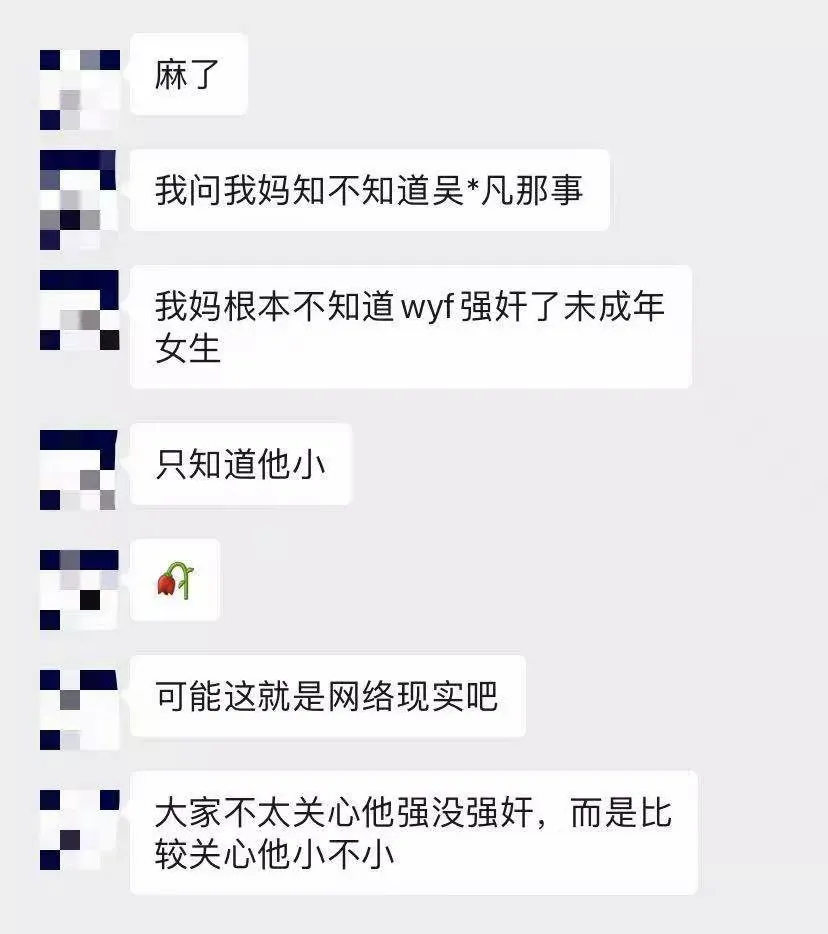
And for this kind of issue, feminist discussion should be able to go beyond. It is not as irrational as these people describe it, nor is it a rejection of rationality and the same choice of "reciprocal sanction"-style "sexual organ humiliation" as a means. Conversely, feminists can bring a combination of evidence and situational analysis into the field of public opinion, providing a more realistic analysis of the Wu Yifan incident and all similar events than a "rational discussion" of masculinity. And this is by no means unconditional favoritism for women, as opponents point out. Because feminist analysis does not represent favoritism towards women, but rather seeks to reverse the unfair claims of women in the existing discourse (taking into account factors such as the fact that victims of sexual assault are mainly women).
In many cases, the truth cannot be obtained by waiting neutrally as a bystander, and justice cannot be proved by whether a party is imprisoned or not. Obviously, many netizens believe that the most important thing to be a "melon eater" in such an event is to remain rational and objective, and to treat Wu Yifan and the girls who accuse him as opposites with an attitude of "everyone is equal before the law". waiting individuals. However, people also have to admit that the law has some flaws, not a panacea.
Even if the law were perfectly fair, it would be difficult to identify a party as a victim and provide protection without evidence (even if in fact he was violated). In this case, maintaining "objective neutrality" for both parties is problematic. A relatively powerful person like Wu Yifan, or someone with a premeditated plan, can easily prevent the other party from obtaining evidence, or use money to undermine the credibility of the other party's testimony. Experiencing traumatic behavior can also make the victim more emotional and unable to make judgments or express clearly. Therefore, real power asymmetries should not be ignored in commenting, analyzing, and speculating about matters—not to mention, discussions are quite different from legal decisions. Therefore, in many discussion venues, the requirement of "rational objectivity" is very problematic. They may have mistaken the 50 each for justice, or they may have implicitly imposed unequal moral responsibilities on both parties (such as requiring the potential victim of sexual assault to have the same good mental state as the perpetrator), or even based on the Conjectures make inferences. The correct attitude is to consider the situation of both parties and make judgments based on this. Considering the content other than the evidence provided by the police is not irrational favoritism, but rather a reasonable position, because Wu Yifan does have power asymmetry with the women who accuse him. Maintaining complete neutrality and restraint with regard to (highly likely) potential sexual assault on these occasions can lead to unfair judgments and consequential harm.
On the other hand, feminists should also think about what kind of action is more effective and better, rather than just using sarcastic words like "Wu sign" as a radical and effective action. Strong stance and effective criticism do not always have to be carried out through fierce and offensive rhetoric, and even in this case we found a conflict between the two.
Vague and seemingly radical rhetoric is often appropriated by opponents of feminism, and this is not just a problem with this one incident, but a problem that the entire feminist movement and other related movements need to think about.


Like my work?
Don't forget to support or like, so I know you are with me..
Comment…